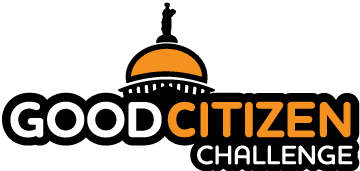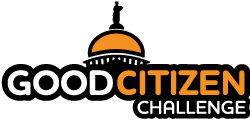Activities
Browse the list below to see which Activities you can complete to earn points. You must choose at least one from each category. Remember: You need 251 total points to become a Good Citizen.
Completed an Activity?
Sign in to your player account and go to the activities page to submit evidence and get your points!

History
MEMORIZATION – 50 POINTS
Memorize the Gettysburg Address and take a video of yourself delivering it.
See the transcript.
HISTORY KITS – 30 POINTS
Send away for one of the Vermont History Kits from the Vermont Historical Society. Take a picture with the contents of the kit. What was your favorite item from the kit? Why?
Find the kits here.
READ A BOOK – 30 POINTS
Read the 2019 Vermont Humanities Vermont Reads book, March: Book One. Write a paragraph citing three things you learned.
Here’s the VH announcement about the book’s selection.
READ A BOOK – 30 POINTS
Read a book on Vermont history recommended by your teacher or local librarian. Report which one you read and explain five things you learned from it.
HISTORY LESSON – 30 POINTS
Do one of the nine activities listed at the Vermont History Explorer website, created by the Vermont Historical Society. Take a photo of you and/or your group doing this activity.
Find the activities here.
VISIT A MUSEUM – 20 POINTS
Visit the Vermont History Museum and take a photo of your visit. Write down three things you learned there.
VISIT A MUSEUM – 20 POINTS
Visit Billings Farm & Museum. What was your favorite exhibit? Take a photo with it and tell us about it.
VISIT A MEMORIAL – 10 POINTS
Visit a historic monument or memorial in your town. Take a photo there. Who is this monument or memorial honoring? Why was it put here? Do you recognize any of the names of people listed on it?
DRAW A PORTRAIT – 20 POINTS
Draw a portrait of an American patriot from the past. Write a paragraph explaining who you chose and why.
MAKE A MEME – 10 POINTS
Make a meme about one or more aspects of Vermont history and send it to us.
Adobe Spark is one meme-making tool.
LISTEN TO A PODCAST – 10 POINTS
Listen to the “A(nother) Brief History of Vermont Road Names” episode of Vermont Public Radio’s podcast Brave Little State. It aired on September 6, 2019. Tell us which road name you liked best and why.
Find the podcast and transcript to review here.
LISTEN TO A PODCAST – 10 POINTS
Learn about a Union spy ring in the Confederate capital, Richmond, Virginia, during the Civil War by listening to “The Ring,” an episode of the podcast “Uncivil.” If you were in Mary Bowser’s position, what would you have done? Write a paragraph to explain.
Find the podcast and transcript to review here.

Government
RECRUIT VOLUNTEERS – 50 POINTS
What volunteer positions does your town have trouble filling? Ask the town clerk, city council, mayor or city manager. Make a poster encouraging residents to volunteer. Ask if city hall, your town office, community center or library will hang it up, or find a local business with a bulletin board. Be sure to put the title of the position(s) and the contact information for the volunteer coordinator (and make sure you have their permission). Take a photo or have someone else take a photo of you with your poster.
INTERVIEW AN ELECTED OFFICIAL – 40 POINTS
Invite a current or former elected official to talk to your class. Ask them why they ran for office, what they love or loved about serving their community, and what their hardest decision was in that role. Take a photo of the visit and report on what they said. What was something they said that surprised, disappointed or impressed you?
READ A COMIC BOOK – 30 POINTS
Read This Is What Democracy Looks Like: A Graphic Guide to Governance, from the Center for Cartoon Studies in White River Junction. Write a paragraph about it. How did it make you feel? What’s something you can do to get involved in our democracy?
Find more information and a free download of the comic book.
DRAW A CARTOON – 30 POINTS
Draw a cartoon illustrating the concept of separation of powers among the three branches of government, also known as the system of checks and balances.
ATTEND A MEETING – 20 POINTS
Attend a local city council, selectboard or school board meeting, and take a picture to prove you were there. Tell us: What was the most interesting thing they talked about? Does it affect your life? If so, how? If not, who does it affect?
MAKE A MEME – 10 POINTS
Make a meme about why it’s important to vote and send it to us.
Adobe Spark is one meme-making tool.
VISIT AN EXHIBIT – 20 POINTS
Visit the “Votes… for Women?” exhibit at the Middlebury College Museum of Art (through December 8, 2019). It’s been almost a century since the passage of the 19th Amendment to the Constitution, which granted women the right to vote. Pick one of the photos you saw and explain why it caught your attention.
VISIT THE STATEHOUSE – 20 POINTS
Visit the Vermont Statehouse and take a photo of yourself there. How did it feel to walk into this historic building? Did you feel welcome there? What were some of the building’s features that made you feel welcome or stood out to you?
MAKE A POSTER – 20 POINTS
Make a poster encouraging adults to vote. Scan it or photograph it and send it to us.
PLAY A VIDEO GAME – 10 POINTS
Gerrymandering is the practice of drawing congressional districts in a way that favors one political party over another. Learn how this practice affects elections by playing Gerry Mander: A Voting District Puzzle Game by Vermont-based GameTheory. Have someone take a photo of you playing the game.
Play the game here.

News Literacy
LISTEN TO A PODCAST – 10 POINTS
Listen to the podcast Your Undivided Attention, episode 3, “With Great Power Comes Great Responsibility.” How did this affect the way you view social media?
Find the podcast and a transcript to review here.
MAKE A NEWSPAPER – 50 POINTS
If your school does not have a newspaper, create a sample issue with stories about your school and community. Make copies using a photocopier and distribute it. Some ideas for content: Interview people such as coaches, the librarian, cafeteria workers, instructional aides or janitors. Talk with the president of the local historical society. Interview elders at the senior center about where they grew up and how the community has changed over time.
MAKE A NEWSCAST – 50 POINTS
Make a video newscast or document a community event using equipment from your local cable access station or Community Media Center. Some ideas for content: Interview people such as coaches, the librarian, cafeteria workers, instructional aides or janitors. Talk with the president of the local historical society. Interview elders at the senior center about where they grew up and how the community has changed over time.
Find your local center at this website.
MAKE A PODCAST – 50 POINTS
Make a podcast about your school or your community. Some ideas for content: Interview people such as coaches, the librarian, cafeteria workers, instructional aides or janitors. Talk with the president of the local historical society. Interview elders at the senior center about where they grew up, and how the community has changed over time.
INTERVIEW A JOURNALIST – 40 POINTS
Invite a current or former journalist, editor or news director to talk with your class. Ask them why they got into journalism, what they love or loved about their work, and what was the most important story they ever helped to tell. Take a photo of this person talking with your group and tell us: What was something they said that surprised, disappointed or impressed you?
DO A TRAINING – 30 POINTS
Do a media training at your local cable access station or Community Media Center. Learn how to use the equipment they make available to the public. Take a photo there.
Find your local center at this website.
DRAW A CARTOON – 30 POINTS
Draw a persuasive, or editorial, cartoon that explains why news literacy is important. Scan or photograph it and send it to us.
LISTEN TO PODCASTS – 20 POINTS
Listen to the podcast Your Undivided Attention, episodes 5 and 6, “From Russia With Likes” parts 1 and 2. Tell us: How can you fight misinformation online?
Find the podcast and transcripts to review here.
MAKE A MEME – 10 POINTS
Make a meme about some aspect of news literacy, for example: Why you should check to make sure something is true before you share it. Send us your meme.
Adobe Spark is one meme-making tool.
SUBSCRIBE TO A NEWSLETTER – 10 POINTS
Subscribe to the Sift, or Get Smart About News, email newsletters from the News Literacy Project. Read a newsletter and tell us one thing you learned.
Subscribe here.
READ A NEWSPAPER – 10 POINTS
Get a print copy of a local newspaper. Flip through the pages, from front to back, then answer the following questions: What catches your eye? In your opinion, what is the most interesting part? What would you like to see more of? What stories do you wish you could read there? What did you learn that you didn’t know before?
WATCH THE TV NEWS – 10 POINTS
Watch a local news broadcast on TV, from start to finish, then answer the following questions: What was the most important thing you learned? What was your favorite part of the broadcast? What stories would you like to see TV reporters cover?
WATCH A NEWS PROGRAM – 10 POINTS
Watch a broadcast of “Vermont This Week” on Vermont PBS. Answer the following questions: In your opinion, what was the most important story they discussed? The most interesting? Did you learn anything new?
Watch a broadcast online here.

Community Engagement
ORGANIZE AN EVENT – 50 POINTS
In 2018, Vermonters Zac Mayo and Lucy Rogers were running against each other for a seat in the Vermont Legislature. After their debate at a library in Jeffersonville, they played a duet — Mayo on the guitar, Rogers on cello. This story made national headlines because it showed that the two candidates could put politics aside and work together. Your challenge: Organize an event in which people who disagree with each other on an important issue work together on something that benefits your community. Possible examples include an art project, a musical performance, a community service project or a fundraising drive for a local charity. Document this event with photos or video of people working together. Tell us: How did this experience affect you and the others who participated?
This is a National Public Radio story about the Mayo-Rogers debate duet.
SOCIAL MEDIA BREAK – 50 POINTS
Try a weeklong social media break (only applicable for groups in which the majority of participants use social media). Have everyone in your class pledge to delete social media apps from their phones for a week. Take photos to show or explain what you did and explain how it went.
Kick off the week by showing this video.
INTERVIEW A VOLUNTEER – 40 POINTS
Invite a current or former town volunteer to talk to your class. Ask them why they signed up to volunteer, what they love or loved about serving their community, and what was the most meaningful experience they’ve had because of their service. Take a picture of their visit. Tell us: What was something they said that surprised or impressed you?
ORGANIZE A DONATION DRIVE – 40 POINTS
Organize a donation drive for a local charity. Examples: Collect food for your local food shelf, collect diapers for your local homeless shelter (for homeless families with infants), collect winter coats to donate to a local aid organization, help Toys for Tots collect presents for kids during the end-of-year holidays. Get contributions from people outside of your family. Take a photo with the items you collect and tell us where you’re donating them.
CITIZENSHIP PRINCIPLES – 40 POINTS
Learn about the five principles of citizenship, and discuss how to be a good citizen online. These are lessons 1 and 2 in Unit 2 of the national CyberCivics curriculum, used locally by the Lake Champlain Waldorf School. Take a photo of your group doing these activities. Write a paragraph about how you hope this changes the way you interact with others. Follow the instructions listed on this website.
Find instructions here.
CREATE A CODE OF CONDUCT – 30 POINTS
Create a Code of Conduct for your classroom. This is lesson 2 from Unit 4 of the national CyberCivics curriculum, used locally by the Lake Champlain Waldorf School. Follow the instructions listed here. Show photos of the rules your class makes.
Find instructions here.
LISTEN TO PODCASTS – 20 POINTS
Listen to episodes 1 and 2 of the podcast Your Undivided Attention. Tell us: Did it change the way you think about smartphones?
Find the podcast and a transcript for review here.
RECORD AN INTERVIEW – 20 POINTS
Record an interview for the One Small Step project from StoryCorps. What did you learn about the person you interviewed?
Find more info on One Small Step at the StoryCorps website.
SIGN UP FOR FPF – 10 POINTS
Join Front Porch Forum (if you are not already a member). You can sign up with your email address, or have your parents sign up at theirs. Describe one post from the forum that you found interesting or useful.
Sign up here.
WRITE A THANK YOU NOTE – 10 POINTS
Choose a local board or organization in your town that’s run by volunteers (for example, the volunteer rescue squad). Write a thank you note to them. Take a photo of it before you send it. You can repeat this activity up to 5 times.
PICK UP TRASH – 10 POINTS
Pick up litter by a road or park in your town. Take a photo. You can repeat this activity up to 2 more times.

Advocacy
ORGANIZE A DEBATE – 50 POINTS
Organize a debate in your classroom about an important national or local issue. Assign people to represent the side that they don’t agree with. Assign another group of students to be the judges. Take a group photo. Tell us: What arguments did the judges find most compelling? Who made the stronger case?
TALK WITH AN OPPONENT – 40 POINTS
Find someone you know who disagrees with you about an important political issue and arrange to have a civil conversation with them about that issue. Ask them why they hold their belief. Explain why you hold yours. Present evidence, not just opinions. Did this make you think differently about your belief? Tell us: Did this make you think differently about them or their beliefs? Take a photo with this person afterward.
WRITE TO AN ACTIVIST – 30 POINTS
Write a handwritten letter to an elected official, community leader or activist you admire. Ask them to tell you how they first got involved in politics, community service or activism? Ask them what advice they have for you, as a young person? Take a photo of yourself with your letter before you mail it.
READ A BOOK – 30 POINTS
Read the 2020 Vermont Humanities Vermont Reads book, The Hate U Give. Write a paragraph describing what you think of Starr’s decision to speak out.
Here’s an announcement from VH about the book’s selection.
WRITE A LETTER TO THE EDITOR – 20 POINTS
Write a letter to the editor of a local newspaper or magazine about an issue that’s important to you and propose a solution. Take a photo of it before you send it.
WRITE ABOUT A PROTEST – 20 POINTS
Have you attended a rally or protest? If so, tell us: why did you go? How did it make you feel to be gathered with others who shared your viewpoint? Share a photo from this event if you have one.
WRITE TO AN ELECTED OFFICIAL – 20 POINTS
Write to one of your elected officials about an issue that’s important to you and propose an action they could take. Take a photo of yourself with the letter before you send it.


